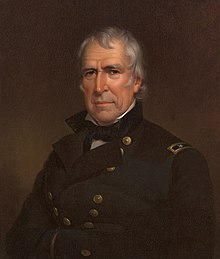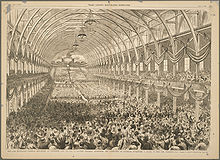Marshall Jewell
Marshall Jewell (October 20, 1825 – February 10, 1883) was a manufacturer, pioneer telegrapher, telephone entrepreneur, world traveler, and political figure who served as 44th and 46th Governor of Connecticut, the US Minister to Russia, the 25th United States Postmaster General, and Republican Party National Chairman.
Jewell, distinguished for his fine "china" skin, grey eyes, and white eyebrows, was popularly known as the "Porcelain Man".
[1] As Postmaster General, Jewell made reforms and was intent on cleaning up the Postal Service from internal corruption and profiteering.
Postmaster Jewell helped Secretary of the Treasury Benjamin H. Bristow shut down and prosecute the Whiskey Ring.
Between 1859 and 1860, Jewell traveled to and visited Europe on business connected with the tannery firm, having returned to the United States during the onset of the American Civil War.
Having returned to Connecticut, Jewell became a wealthy merchant, having invested in the Hartford Evening Post and the Southern New England Telephone Company.
During the onset of the American Civil War Jewell purchased leather putting his business in a good position to gain government contracts.
[3] After the Civil War ended Jewell returned to Europe and extended his travels to Egypt and the Holy Land from 1865 to 1867.
[1][5] Having returned from his extensive world travels abroad, in 1867, Jewell unsuccessfully ran for Connecticut state senator, having joined the Republican Party.
[3] During Jewell's second term in office, Russian Grand Duke Alexis visited Washington, D.C., and Hartford, Connecticut.
[2] While Minister to Russia, a prince from the Russian nobility became infatuated with a married American woman who was visiting St. Petersburg, having given her his family's royal diamonds.
This created quite a scandal; however, Jewell investigated the matter and had the woman return the Russian diamonds to the Tsar's family.
[1] Jewell, who was an observant man, noticed that inferior goods not made in the United States were falsely sold on the open Russian markets under an American name.
Rather than keep this a secret for his own profit, Jewell sent a sample of the birch tar to the United States and American newspapers published how Russia leather was made.
His ethical and progressive business practices, however, soon ran into conflict with those who wanted to the U.S. postal department to distribute patronage and lucrative contracts to brokers and mail route service providers.
[5] In one instance, Jewell fired Boston postmaster, William L. Burt, for non payment of a surety bond and replaced him with Edward C. Tobey on September 18, 1875.
Burt, who would not let the issue settle had several conferences with President Grant one at Long Branch in 1875 and one at Washington, D.C., in 1876 to protest his removal.
Jewell, who did not ask why Grant demanded his resignation, was shocked having believed he had the confidence of the President at the previous Cabinet meeting.
President Grant, suspicious of any Cabinet members whom he was convinced were personally disloyal, believed that Jewell had been treacherous to his Administration and had conspired with another reformer, Secretary of the Treasury, Benjamin H.
Through a series of investments in the Hartford Evening Post and the Southern New England Telephone Company Jewell became a very wealthy man.
Although Bristow was a frontrunner and had Jewell's support, he was considered controversial for his prosecution of the Whiskey Ring, a scandal that involved prominent Republican Party members.
[13] The state of Connecticut named Jewell on the 1876 Republican National Committee who elected Zachariah Chandler as chairman.
[15] A tall column pedestal and statue memorial monument with his family's name, "JEWELL", inscribed at the base, was placed near his burial site.
His daughter was Josephine Jewell Dodge, a prominent early childhood educator and anti-suffrage activist.



